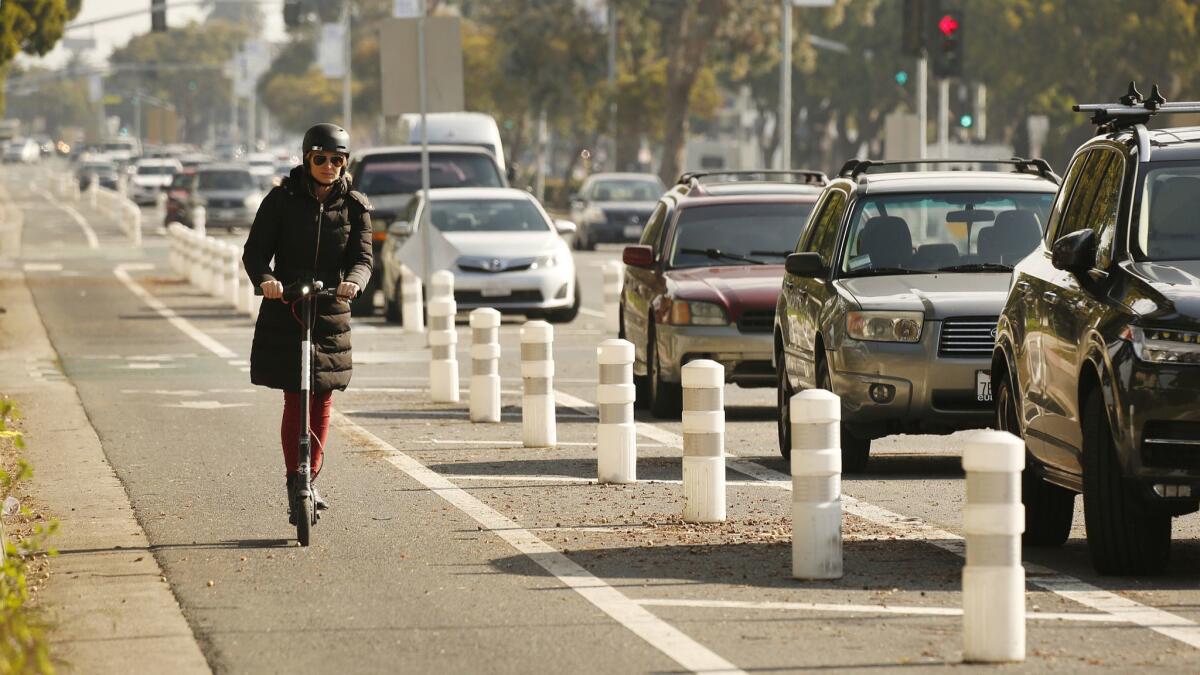No, Big Brother isn’t interested in your scooter ride

- Share via
Add “privacy” to the list of concerns raised by the scooter revolution.
Los Angeles has permitted 11 companies to put 37,000 dockless scooters and bikes on city streets, and the number could jump to 100,000 if the companies place the rent-per-ride vehicles in certain disadvantaged communities.
To their credit, L.A. leaders have largely welcomed scooters with open arms — but also with a caveat: To get a one-year permit to operate, the Department of Transportation requires companies to transmit raw data, including where every scooter or bike trip begins and ends, and whether the vehicle entered zones where riding or parking are restricted.
This detailed information feed lets DOT officials know in real time when companies violate the city’s rules by, for example, exceeding the cap on vehicles or leaving broken scooters on the sidewalk. The data, which will not be public, also helps the DOT understand where people are using rent-per-ride vehicles most frequently so the city can prioritize protected bike lanes or pavement repairs in those high-use corridors.
Enter the Fray: First takes on the news of the minute »
But Uber, which operates Jump scooters, has fought back against the regulations, warning that such extensive data collection is tantamount to government surveillance. It can be hard to untangle Uber’s protests about privacy from its history of fighting regulation by cities. However, privacy advocates have echoed the company’s complaint, noting that while the city won’t collect the identities of the scooters’ riders it’s still possible to combine trip information with other data to identify who rode the scooter and where they went.
Privacy experts have also questioned whether cities, which are generally new to this level of data sharing, have the capacity to manage the data safely. This is no idle concern; many companies (including Uber) have had their customers’ data stolen by hackers.
Los Angeles is stuck in the middle of two hot button issues.
Personal information has become the fuel powering much of the internet, even as users remain largely in the dark about what is being collected and how it is being used. As reports pile up of data breaches and exploitative uses of personal information, consumers have grown increasingly concerned, and lawmakers and activists have begun pushing for tougher protections of privacy rights.
Meanwhile, the arrival of rent-per-ride scooters, ride-hailing companies and on-demand delivery services is creating a scramble for space in the public right-of-way. Cities need the ability to understand and, yes, regulate the space for the greatest good. The public sector needs the private sector’s help — and its data – to do that.
For Los Angeles, the goal should be to get and retain the minimum amount of data necessary to managing the right of way. Big Brother doesn’t need to know where you ride a scooter, but the public should be assured that government has the tools to make sure for-profit companies are good stewards of the public space.
Follow the Opinion section on Twitter @latimesopinion and Facebook
More to Read
A cure for the common opinion
Get thought-provoking perspectives with our weekly newsletter.
You may occasionally receive promotional content from the Los Angeles Times.






